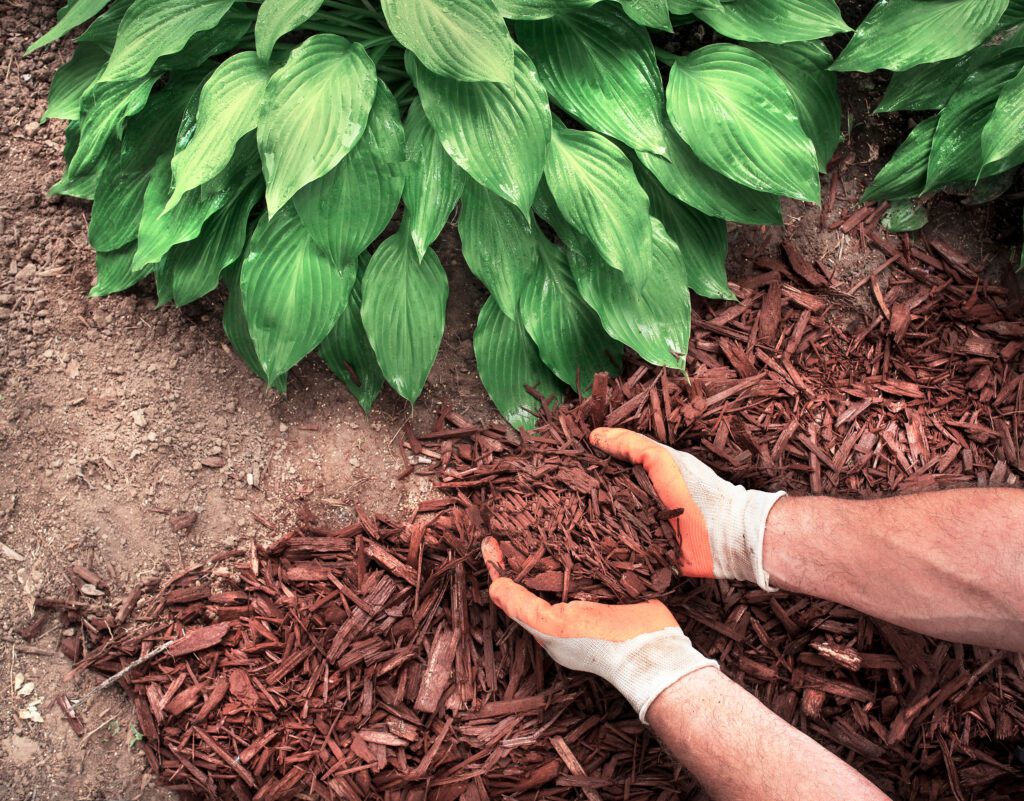Mulching plays a vital role in having a healthy garden that is ready for any season, with numerous benefits including moisture and soil conservation, weed control, and temperature regulation.
There are many types of mulch out there, so it can make be challenging to find the right one for your garden. In this blog, we will delve into the different types, why you might need them, and what factors you should consider before purchasing.

What Is Garden Mulch?
Mulch is a layer of material added on top of the soil to help plants thrive in spring and summer, and protect the soil in the colder months. No garden is complete without mulch as it helps to improve soil health by conserving moisture, regulating temperature, controlling weeds, and adding nutrients to the soil.
Mulch can be organic, such as bark, wood chips, straw, or leaves, or inorganic, such as gravel, plastic, or rubber; both of these come with their own benefits and drawbacks.
Types Of Mulch
Biodegradable mulch
Biodegradable mulch, also known as organic mulch, breaks down gradually and release nutrients into the soil. Examples of biodegradable mulch include woodland mulch made from a combination of softwood and hardwood materials, bark, well rotted manure, leaf mould and seaweed.
Whilst woodland garden mulch typically lasts between 3-6 years, it is a good idea to replace your mulch every 2-3 years to ensure your soil remains as healthy as possible.
Like all nature, nothing is the same; which is why the thickness of organic mulch varies. Our woodland garden mulch ranges include larger chunkier pieces ranging from 0-65mm and should be laid to a depth of 75mm. Whereas our decorative mulch is much finer ranging in sizes from 0-25mm and can be laid to a depth of 50mm.
Non-biodegradable mulch
Non-biodegradable mulch, also known as non-organic mulch, is made from a variety of materials including rubber, plastic and stones which hold their position for a long time without breaking down. As they do not decompose, they can cause biomagnification which will have a long-term negative effect on plant life.
Why Do I Need Mulch?
If your plants are struggling to grow, or wilting earlier than expected, the soil is the most likely culprit. Mulch can help the soil in many ways including:
- Moisture retention
Acting as a protective barrier on the soil surface, it reduces the amount of water that evaporates from the soil, helping to keep the soil moist even in the driest of heat. - Weed prevention
By blocking out sunlight, mulch creates a hostile environment that prevents weed seeds from germinating and growing.
- Fungi feeding
Biodegradable mulches break down over time and provide a food source for fungi in the soil, which in turn allows the plants to effectively absorb nutrients.
- Temperature regulation
Acting as a layer of insulation, mulch helps regulate the temperature of the soil, keeping it cool in the summer and warmer in the winter. This is particularly important in the winter as it prevents the ground from drying out and freezing.
- Soil conservation
If your garden has sloping areas or is in an open area subject to heavy wind and rainfall, mulch can be placed on top to protect the soil.
Alongside helping plant growth, mulch also helps transform the aesthetics of your garden by creating an earthy and natural look inviting in more wildlife.

When Is The Best Time To Put Down Mulch?
Garden mulch can be applied all year round, however, it’s best to do it in spring or autumn when the soil is moist and the weather is not too cold or hot. This allows the mulch to absorb moisture and gradually release it to the plants, promoting healthy growth.
It can also be used in the winter months as it acts as a layer of insulation, regulating the temperature, keeping it warm and not freezing over.
What should I consider when purchasing mulch?
Mulching is a fairly straightforward task, however, there are some things to consider to ensure you get the right mulch for your garden.
Before you start mulching your garden, it’s important to choose the right type. There are many factors to consider including:
- The reason you’re mulching
As mulch is available in different thicknesses, you should consider the reason for purchase; is it to conserve water, control weeds, or improve soil fertility? Or is it purely for aesthetic purposes?
- Climate
Where you live will help determine what mulch is right for you. If you live in a hot climate, a soil-cooling mulch like shredded leaves or straw will ensure your plants are not overheating. If you live in a cool and wet climate, it is best to avoid moisture-retentive mulch as it can result in stunted growth and yellowing.
- Type of soil
Different soil requires different mulch; clay soils benefit from mulch that decomposes quickly to improve soil fertility, whereas sandy soils require mulch that can retain moisture.
Get in touch with Envar today
If you have any questions about mulch, whether it’s what type of mulch you should use or something else, we can help you. At Envar, we have over 30 years of experience in helping home and business customers with composting and mulching, offering advice and recommendations that work best for the situation at hand.
Get in touch with us today at 01487 849 840 or enquiries@envar.co.uk, and a member of our team will be happy to help.






